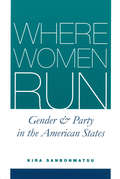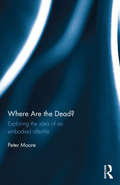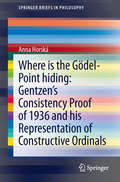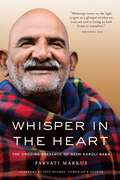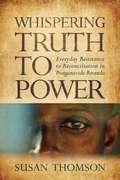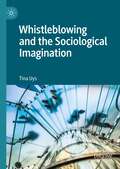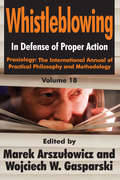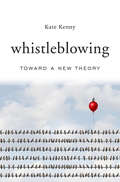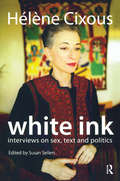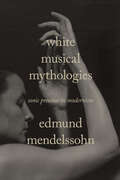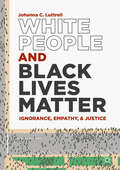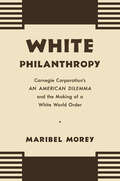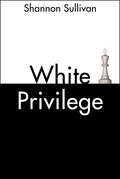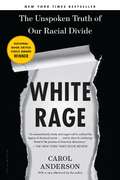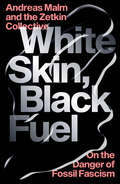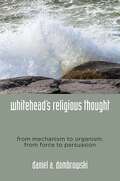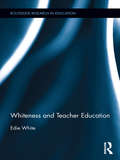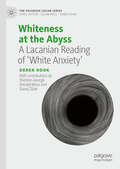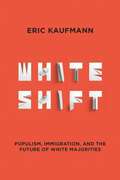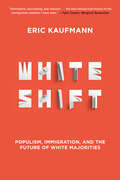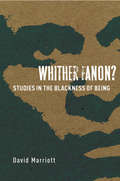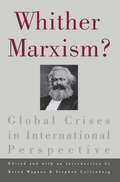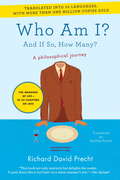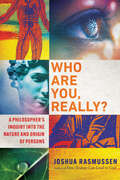- Table View
- List View
Where Women Run
by Kira SanbonmatsuWhy don’t more women run for office? Why are certain states more likely to have female candidates and representatives? Would strengthening political parties narrow the national gender gap?Where Women Runaddresses these important questions through a rare and incisive look at how candidates are recruited. Drawing on surveys and case studies of party leaders and legislators in six states, political scientist Kira Sanbonmatsu analyzes the links between parties and representation, exposing the mechanism by which parties’ informal recruitment practices shape who runs—or doesn’t run—for political office in America. “Kira Sanbonmatsu has done a masterful job of linking the representation of women in elective office to the activities of party organizations in the states. She combines qualitative and quantitative data to show how women are navigating the campaign process to become elected leaders and the changing role of party organizations in their recruitment and election. It is a significant contribution to the study of representative democracy. ” --Barbara Burrell, Northern Illinois University “Sanbonmatsu has produced an excellent study that will invigorate research on the role of political parties and the recruitment of women candidates. Using a variety of methods and data sources, she has crafted a tightly constructed, clearly argued, and exceedingly well-written study. A commendable and convincing job. ” --Gary Moncrief, Boise State University “Sanbonmatsu offers important insights in two neglected areas of American politics: the role of political parties in recruiting candidates and the continued under-representation of women in elected office. Connecting the two subjects through careful qualitative and statistical methods, insightful interpretation of the literature and interesting findings, the book is a significant new addition to scholarship on parties, gender, and political recruitment. ” --Linda Fowler, Dartmouth College Kira Sanbonmatsu is Associate Professor of Political Science at Rutgers University and Senior Scholar at the Eagleton Institute of Politics’ Center for American Women and Politics (CAWP). She was previously associate professor at Ohio State University. She is the author ofDemocrats, Republicans, and the Politics of Women’s Place.
Where are the Dead?: Exploring the idea of an embodied afterlife
by Peter MooreWhere are the dead? What are they doing? What kind of a process is dying? What relationships exist among the dead themselves, and between the dead and those in the world they have left behind? Modern philosophers argue that the idea of disembodied survival - to which many believers pay lip service - is incoherent, and that there can be evidence neither for nor against something incoherent. By contrast, this book argues, the idea of an embodied survival (albeit a form of embodiment differing from our present embodiment) makes perfect sense in itself and fits much better with the alleged evidence for post-mortem survival. Exploring post-mortem survival, Where are the Dead? uses a variety of empirical data, alongside mythological, legendary and purely fictional material, to illustrate how the less familiar idea of embodied post-mortem survival might actually ’work’ in some real afterlife environment. By asking questions about the nature and whereabouts of the afterlife, and about what it might be like to be dead, the book explores themes nowadays relatively neglected even in disciplines explicitly concerned with ideas about death, dying and life after death.
Where is the Gödel-point hiding: Gentzen's Consistency Proof of 1936 and His Representation of Constructive Ordinals
by Anna HorskáThis book explains the first published consistency proof of PA. It contains the original Gentzen's proof, but it uses modern terminology and examples to illustrate the essential notions. The author comments on Gentzen's steps which are supplemented with exact calculations and parts of formal derivations. A notable aspect of the proof is the representation of ordinal numbers that was developed by Gentzen. This representation is analysed and connection to set-theoretical representation is found, namely an algorithm for translating Gentzen's notation into Cantor normal form. The topic should interest researchers and students who work on proof theory, history of proof theory or Hilbert's program and who do not mind reading mathematical texts.
Whisper in the Heart: The Ongoing Presence of Neem Karoli Baba
by Parvati MarkusWhisper in the Heart documents lively accounts from around the world of Neem Karoli Baba, a great Indian saint, appearing in visions and dreams to offer spiritual comfort and guidance. Neem Karoli Baba left his body in 1973, but his presence has continued unabated. He has appeared to thousands of individuals across the globe, in dreams and visions, in meditation, and out of the blue in broad daylight. He comes to open hearts with a blast of unconditional love, to bring comfort and aid in response to calls for help, and as a reminder that we are, indeed, all One. Whisper in the Heart recounts the stories of over 150 people and the ways in which they &“met&” Maharajji, as he is fondly known. It could have been while chanting at a kirtan, while at a spiritual retreat or in a temple, while looking at a photo or reading a book, or as in some of the more extraordinary stories, when he shows up on a desperate woman&’s doorstep in France, brings years of abuse to an end for a nine-year-old child in Australia, dances on a beach in Miami, or appears to a policeman in Taos, New Mexico. Not just for Maharajji devotees, Whisper in the Heart can help those who are having spiritual experiences of connection with enlightened beings who are no longer in the body to accept their reality and to know that they are not, in fact, &“going crazy.&” Maharajji himself used to say: When you think of me, I&’ll be there. In this book, you will get a glimpse of how he is fulfilling that promise. A LEGACY OF LOVE: Whisper in the Heart continues Neem Karoli Baba's mission of universal love, kindness, and connection PERSONAL STORIES: Includes more than 150 accounts of Maharajji appearing in visions, dreams and even in broad daylight HELPING AND HEALING: Visions of Neem Karoli Baba have helped diverse people from around the world heal spiritually and physically MOTIVATING MESSAGE: The moving stories of Maharajji&’s love can inspire a deeper spiritual practice and connection to humanity RAM DASS COLLABORATION: Neem Karoli Baba&’s teachings were brought to the west by Ram Dass, whose Love Serve Remember Foundation continues to preserve his legacy and spread his message
Whispering Truth to Power
by Susan ThomsonFor 100 days in 1994, genocide engulfed Rwanda. Since then, many in the international community have praised the country's postgenocide government for its efforts to foster national unity and reconciliation by downplaying ethnic differences and promoting "one Rwanda for all Rwandans. " Examining how ordinary rural Rwandans experience and view these policies, "Whispering Truth to Power" challenges the conventional wisdom on postgenocide Rwanda. Susan Thomson finds that many of Rwanda's poorest citizens distrust the local officials charged with implementing the state program and believe that it ignores the deepest problems of the countryside: lack of land, jobs, and a voice in policies that affect lives and livelihoods. Based on interviews with dozens of Rwandan peasants and government officials, this book reveals how the nation's disenfranchised poor have been engaging in everyday resistance, cautiously and carefully--"whispering" their truth to the powers that be. This quiet opposition, Thomson argues, suggests that some of the nation's most celebrated postgenocide policies have failed to garner the grassroots support needed to sustain peace.
Whistleblowing and the Sociological Imagination
by Tina UysThis authoritative book explores cases of whistleblowing from around the world, with a focus on cases in South Africa. Whistleblowing is a vital tool in the fight against corruption and other forms of organizational wrongdoing. The author develops a sociology of whistleblowing by employing C. Wright Mills’ concept of the sociological imagination that examines the private troubles and public issues related to whistleblowing. Organizational wrongdoing is a public issue that the whistleblower tries to expose so that it can be corrected and whistleblowing also is a personal trouble that can have devastating consequences for the whistleblower and his/her family, friends, and colleagues. After analyzing whistleblowing in terms of the personal troubles and public issues, this engrossing book considers ways in which whistleblowers and organizations could be supported to promote the public interest while mitigating the possible negative consequences for whistleblowers, organizations and our societies. This book is a must read for policymakers, researchers, whistleblowers and those who are interested in a just society.
Whistleblowing: In Defense of Proper Action
by Wojciech W. GasparskiThis latest volume in this important international series discusses practical errors and wrongdoing considered under the action theory (praxiological) umbrella, linking these to ethical behavior. Human actions related to the conduct of business should be effective and efficient. But such praxiological criteria are of secondary importance to norms that should also be taken into account. The primary norm is ethical behavior, which defines the morality of business activities on the basis of the good; these are the presupposed foundations for the human actions in business.The articles in this volume discuss whistleblowing, or the exposure of behavior that violates the ethical foundations of business. They are written from different angles and present a variety of experiences, adding new value to both the subject of praxiology as well as ethics as it relates to economic activity in its social and global context. The issues, problems, and questions raised by this international group of eminent scholars have much to add to the contemporary debate induced by the present economic crises. These crises have revealed practical errors and hypocrisy of those responsible for leadership and management, primarily of financial institutions.
Whistleblowing: Toward a New Theory (Wiley Finance Ser.)
by Kate KennySociety needs whistleblowers, yet to speak up and expose wrongdoing often results in professional and personal ruin. Drawing on the stories of men and women who reported unethical and illegal conduct in corporations, Kate Kenny explains why this is so, and what must be done to protect those who have the courage to expose the truth.
White Ink: Interviews on Sex, Text and Politics (European Perspectives: A Series In Social Thought And Cultural Criticism Ser.)
by Susan Sellers Helene CixousHelene Cixous is widely regarded as one of the world's most influential feminist writers and thinkers. "White Ink" brings together her most revealing interviews, available in English for the first time. Spanning over four decades and including a new interview with the editor Susan Sellers, this collection presents a brilliant, running commentary on the subjects at the heart of Cixous' writing.Here, Cixous discusses her books and her creative process, her views on and insights into literature, philosophy, theatre, politics, aesthetics, faith and ethics, human relations and the state of the world. As she responds to interviewers' questions, Cixous is prompted to reflect on her roles and activities as poet, playwright, feminist theorist, professor of literature, philosopher, woman, Jew. Each interview is a remarkable performance, an event in language and thought where Cixous' celebrated intellectual and poetic force can be witnessed 'in action'. The accessibility of the interview format provides an excellent starting-point for readers new to Cixous, while those already familiar with her work will find unexpected insights and fresh elucidations of her thought.
White Musical Mythologies: Sonic Presence in Modernism (Sensing Media: Aesthetics, Philosophy, and Cultures of Media)
by Edmund MendelssohnIn a narrative that extends from fin de siècle Paris to the 1960s, Edmund Mendelssohn examines modernist thinkers and composers who engaged with non-European and pre-modern cultures as they developed new conceptions of "pure sound." Pairing Erik Satie with Bergson, Edgard Varèse with Bataille, Pierre Boulez with Artaud, and John Cage with Derrida, White Musical Mythologies offers an ambitious critical history of the ontology of sound, suggesting that the avant-garde ideal of "pure sound" was always an expression of western ethnocentrism. Each of the musicians studied in this book re-created or appropriated non-European forms of expression as they conceived music ontologically, often thinking music as something immediate and immersive: from Satie's dabblings with mysticism and exoticism in bohemian Montmartre of the 1890s to Varèse's experience of ethnographic exhibitions and surrealist poetry in 1930s Paris, and from Boulez's endeavor to theorize a kind of musical writing that would "absorb" the sounds of non-European musical traditions to Cage, who took inspiration from Eastern thought as he wrote about sound, silence, and chance. These modernist artists believed that the presence effects of sound in their moment were more real and powerful than the outmoded norms of the European musical past. By examining musicians who strove to produce sonic presence, specifically by re-thinking the concept of musical writing (écriture), the book demonstrates that we cannot fully understand French theory in its novelty and complexity without music and sound.
White People and Black Lives Matter: Ignorance, Empathy, and Justice
by Johanna C. LuttrellThis book interrogates white responses to black-led movements for racial justice. It is a philosophical self-reflection on the ways in which ‘white’ reactions to Black Lives Matter stand in the way of the movement’s important work. It probes reactions which often prevent white people from according to black activists the full range of human emotion and expression, including joy, anger, mourning, and political action. Johanna C. Luttrell encourages different conceptions of empathy and impartiality specific to social movements for racial justice, and addresses objections to identity politics.
White Philanthropy: Carnegie Corporation's An American Dilemma and the Making of a White World Order
by Maribel MoreySince its publication in 1944, many Americans have described Gunnar Myrdal's An American Dilemma as a defining text on U.S. race relations. Here, Maribel Morey confirms with historical evidence what many critics of the book have suspected: An American Dilemma was not commissioned, funded, or written with the goal of challenging white supremacy. Instead, Morey reveals it was commissioned by Carnegie Corporation president Frederick Keppel, and researched and written by Myrdal, with the intent of solidifying white rule over Black people in the United States.Morey details the complex global origins of An American Dilemma, illustrating its links to Carnegie Corporation's funding of social science research meant to help white policymakers in the Anglo-American world address perceived problems in their governance of Black people. Morey also unpacks the text itself, arguing that Myrdal ultimately complemented his funder's intentions for the project by keeping white Americans as his principal audience and guiding them towards a national policy program on Black Americans that would keep intact white domination. Because for Myrdal and Carnegie Corporation alike, international order rested on white Anglo-Americans' continued ability to dominate effectively.
White Privilege (THINK)
by Shannon SullivanSome embrace the idea of white privilege as an important concept that helps us to make sense of the connection between race and social and political disadvantages, while others are critical or even hostile. Regardless of personal views, it can be difficult to agree on what 'white privilege' even means. Philosopher Shannon Sullivan cuts through the confusion and cross-talk to challenge what ‘everybody knows’ about white privilege. Using real-life examples, she offers a candid assessment of the advantages and disadvantages of the term, to present a better understanding of how race functions in our societies. She argues that white privilege is about more than race, that not only white people can have white privilege, and that feeling guilty about privilege can have a negative effect on the very people you feel guilty towards. In the end, she offers practical solutions for eliminating white privilege and building a fairer society. Sullivan's forcefully argued book will inspire you to think again about white privilege and what it entails.
White Rage: The Unspoken Truth of Our Racial Divide
by Carol Anderson<P>From the end of the Civil War to our combustible present, an acclaimed historian reframes the conversation about race we must continue to have, chronicling the powerful forces that have long opposed black progress in America. <P>As Ferguson, Missouri, erupted in August 2014, with media commentators referring to the angry response of African Americans yet again as "black rage," historian Carol Anderson wrote a remarkable op-ed in the Washington Post showing that this was, instead, "white rage" at work. "With so much attention on the flames," she writes, "everyone had ignored the kindling." <P>Now, in her eloquent and powerfully argued narrative, Anderson makes clear that since 1865 and the passage of the Thirteenth Amendment, every time African Americans have made advances toward full participation in our democracy, white reaction--usually in the courts and legislatures--has fueled a deliberate and relentless rollback of their gains. <P>The end of the Civil War and Reconstruction was greeted with the Black Codes and Jim Crow. <P>The Great Migration north was physically opposed in many Southern states, and blacks often found conditions in the North to be no better. The Supreme Court's landmark 1954 Brown v. Board of Education decision was met with the shutting down of public schools throughout the South while taxpayer dollars financed segregated white private schools. <P>The Civil Rights Act of 1964 and Voting Rights Act of 1965 triggered a coded but powerful response--the so-called Southern Strategy and the War on Drugs that disenfranchised and imprisoned millions of African Americans. <P>The election of Barack Obama, and the promise it heralded of healing our racial divide, precipitated instead a rash of voter suppression laws in Southern and swing states, while the Supreme Court's decision in Shelby County v. Holder gutted a key provision of the Voting Rights Act. <P>Carefully linking these and other historical flash points when social progress for African Americans was countered by deliberate and cleverly crafted white opposition, Anderson pulls back the veil that has long covered punitive actions allegedly made in the name of protecting democracy, fiscal responsibility, or protection against fraud. <P>Compelling and dramatic in the unimpeachable history it relates over a century and a half, White Rage will add an important new dimension to the national conversation about race in America. <P><b>A New York Times Bestseller</b>
White Rage: The Unspoken Truth of Our Racial Divide
by Carol AndersonNational Book Critics Circle Award Winner New York Times Bestseller A New York Times Notable Book of the Year A Washington Post Notable Nonfiction Book of the Year A Boston Globe Best Book of 2016 A Chicago Review of Books Best Nonfiction Book of 2016 From the Civil War to our combustible present, acclaimed historian Carol Anderson reframes our continuing conversation about race, chronicling the powerful forces opposed to black progress in America. As Ferguson, Missouri, erupted in August 2014, and media commentators across the ideological spectrum referred to the angry response of African Americans as "black rage," historian Carol Anderson wrote a remarkable op-ed in The Washington Post suggesting that this was, instead, "white rage at work. With so much attention on the flames," she argued, "everyone had ignored the kindling. " Since 1865 and the passage of the Thirteenth Amendment, every time African Americans have made advances towards full participation in our democracy, white reaction has fueled a deliberate and relentless rollback of their gains. The end of the Civil War and Reconstruction was greeted with the Black Codes and Jim Crow; the Supreme Court's landmark 1954 Brown v. Board of Education decision was met with the shutting down of public schools throughout the South while taxpayer dollars financed segregated white private schools; the Civil Rights Act of 1964 and Voting Rights Act of 1965 triggered a coded but powerful response, the so-called Southern Strategy and the War on Drugs that disenfranchised millions of African Americans while propelling presidents Nixon and Reagan into the White House, and then the election of America's first black President, led to the expression of white rage that has been as relentless as it has been brutal. Carefully linking these and other historical flashpoints when social progress for African Americans was countered by deliberate and cleverly crafted opposition, Anderson pulls back the veil that has long covered actions made in the name of protecting democracy, fiscal responsibility, or protection against fraud, rendering visible the long lineage of white rage. Compelling and dramatic in the unimpeachable history it relates, White Rage will add an important new dimension to the national conversation about race in America.
White Skin, Black Fuel: On the Danger of Fossil Fascism
by Andreas Malm The Zetkin CollectiveRising temperatures and the rise of the far right. What disasters happen when they meet?In the first study of the far right&’s role in the climate crisis, White Skin, Black Fuel presents an eye-opening sweep of a novel political constellation, revealing its deep historical roots. Fossil-fuelled technologies were born steeped in racism. No one loved them more passionately than the classical fascists. Now right-wing forces have risen to the surface, some professing to have the solution—closing borders to save the nation as the climate breaks down. Epic and riveting, White Skin, Black Fuel traces a future of political fronts that can only heat up.
Whitehead's Religious Thought: From Mechanism to Organism, From Force to Persuasion
by Daniel A. DombrowskiThis original interpretation of the religious thought of Alfred North Whitehead highlights Whitehead's moves from mechanism to organism, and from force to persuasion to offer a third alternative between classical theism and religious skepticism. Daniel A. Dombrowski argues that the move from force to persuasion, in particular, is not only fundamental to Whitehead's own thought and to process thought in general, but is a necessary condition for the continuing existence of civilized life. Following this line of analysis, Dombrowski demonstrates Whitehead's relevance to contemporary work in philosophy of mind, political philosophy, and environmental ethics by placing him in dialogue with six major thinkers: David Ray Griffin, Isabelle Stengers, John Rawls, Charles Hartshorne, Judith Butler, and William Wordsworth.
Whiteness and Teacher Education (Routledge Research in Education)
by Edie WhiteDue to the rise of internet use and a move toward globalization, it may be assumed that white millennial college students are more accepting of cultural diversity and are more likely to be advocates for social justice than generations that have come before them. This project shows that while many white students know how to speak the language of "correctness" and to some degree even believe in what they are saying, their limited personal experiences with those who are racially different from themselves often bump against their beliefs about racial acceptance and equality. This project investigates the ways that one facet of identity, whiteness, influences teachers’ understanding of their roles in the schools and informs their decision making within their practice. It explores several life stories of five teacher candidates, all born after 1985. Through these stories we get a sense of how white prospective teachers imagine themselves as teachers of diverse students and how they imagine developing equitable practices. This work advocates that teacher educators help pre-service teachers unpack and understand their biases in order to facilitate their students in balancing their life experiences with whom they imagine themselves to be as teachers.
Whiteness at the Abyss: A Lacanian Reading of ‘White Anxiety’ (The Palgrave Lacan Series)
by Derek Hook&‘Whiteness&’ is an omnipresent term within research on race and racism. This book differs from existing conceptualizations by adopting a psychoanalytic line of approach and by directing its attention to a particular socio-historical instantiation of whiteness—the investments, fantasies and fears apparent within (post) apartheid South African contexts. It foregrounds the notion of &‘white anxiety&’, which is conceptualized not only via notions of psychical temporality, but with reference to the dystopian visions of the future, ideas of inter-generational guilt, and fantasies of demise. To posit an imagined &‘end to whiteness&’ is not, of course, an uncontroversial gesture; the closing section of the book surveys the key themes—antisemitism, white Nationalism, the trope of the race traitor—in online attacks the author was subjected to. This compelling work will appeal to all those with an interest in psychoanalytic approaches to race and racism, and to anyone working in the areas of critical race and whiteness studies.
Whiteshift: Populism, Immigration, and the Future of White Majorities
by Eric KaufmannWhiteshift: the turbulent journey from a world of racially homogeneous white majorities to one of racially hybrid majorities <P><P>This is the century of whiteshift. As Western societies are becoming increasingly mixed-race, demographic change is transforming politics. Over half of American babies are non-white, and by the end of the century, minorities and those of mixed race are projected to form the majority in the UK and other countries. The early stages of this transformation have led to a populist disruption, tearing a path through the usual politics of left and right. Ethnic transformation will continue, but conservative whites are unlikely to exit quietly; their feelings of alienation are already redrawing political lines and convulsing societies across the West. One of the most crucial challenges of our time is to enable conservatives as well as cosmopolitans to view whiteshift as a positive development. <P><P>In this groundbreaking book, political scientist Eric Kaufmann examines the evidence to explore ethnic change in North American and Western Europe. Tracing four ways of dealing with this transformation--fight, repress, flight, and join--he charts different scenarios and calls for us to move beyond empty talk about national identity. If we want to avoid more radical political divisions, he argues, we have to open up debate about the future of white majorities. <P><P>Deeply thought-provoking, enriched with illustrative stories, and drawing on detailed and extraordinary survey, demographic, and electoral data, Whiteshift will redefine the way we discuss race in the twenty-first century.
Whiteshift: Populism, Immigration, and the Future of White Majorities
by Eric Kaufmann“This ambitious and provocative work . . . delves into white anxiety about the demographic decline of white populations in Western nations” (Publishers Weekly).“Whiteshift” is defined as the turbulent journey from a world of racially homogeneous white majorities to one of racially hybrid majorities. In this dada-driven study, political scientist Eric Kaufmann explores how these demographic changes across Western societies are transforming their politics. The early stages of this transformation have led to a populist disruption, tearing a path through the usual politics of left and right. If we want to avoid more radical political divisions, Kaufmann argues, we have to enable white conservatives as well as cosmopolitans to view whiteshift as a positive development. Kaufmann examines the evidence to explore ethnic change in North American and Western Europe. Tracing four ways of dealing with this transformation—fight, repress, flight, and join—he makes a persuasive call to move beyond empty talk about national identity. Deeply thought provoking, enriched with illustrative stories, and drawing on detailed and extraordinary survey, demographic, and electoral data, Whiteshift will redefine the way we discuss race in the twenty-first century.
Whither Fanon?: Studies in the Blackness of Being (Cultural Memory in the Present)
by David MarriottFrantz Fanon may be most known for his more obviously political writings, but in the first instance, he was a clinician, a black Caribbean psychiatrist who had the improbable task of treating disturbed and traumatized North African patients during the wars of decolonization. Investigating and foregrounding the clinical system that Fanon devised in an attempt to intervene against negrophobia and anti-blackness, this book rereads his clinical and political work together, arguing that the two are mutually imbricated. For the first time, Fanon's therapeutic innovations are considered along with his more overtly political and cultural writings to ask how the crises of war affected his practice, informed his politics, and shaped his subsequent ideas. As David Marriott suggests, this combination of the clinical and political involves a psychopolitics that is, by definition, complex, difficult, and perpetually challenging. He details this psychopolitics from two points of view, focusing first on Fanon's sociotherapy, its diagnostic methods and concepts, and second, on Fanon's cultural theory more generally. In our present climate of fear and terror over black presence and the violence to which it gives rise, Whither Fanon? reminds us of Fanon's scandalous actuality and of the continued urgency of his message.
Whither Marxism?: Global Crises in International Perspective
by Stephen Cullenberg Bernd MagnusFirst published in 1995. Routledge is an imprint of Taylor & Francis, an informa company.
Who Am I?: And If So, How Many?
by Shelley Frisch Richard David Precht#1 INTERNATIONAL BESTSELLERTRANSLATED INTO 23 LANGUAGES, WITH MORE THAN ONE MILLION COPIES SOLD What is truth? What is love? Does life have meaning? Bestselling author Richard David Precht, "the Mick Jagger of the nonfiction book" (Tagesanzeiger Zürich), has traveled the globe searching for answers--and his odyssey has become one of the most talked-about books around the world. Combining classic philosophy and cutting-edge neuroscience, Precht guides readers through the thickest jungles of academic discourse with the greatest of ease, taking on subjects as challenging and divisive as abortion, cloning, the eating of animals, euthanasia, the ethics of reproductive science, and the very future of humanity.Who knows? By the end of this wildly entertaining journey, you just might be able to answer, Who Am I?From the Trade Paperback edition.
Who Are You, Really?: A Philosopher's Inquiry into the Nature and Origin of Persons
by Joshua RasmussenWhat does it mean to be human? What is a person? Where did we come from? Many answers have been offered throughout history in response to these perennial questions, including those from biological, anthropological, sociological, political, and theological approaches. And yet the questions remain. Philosopher Joshua Rasmussen offers his own step-by-step examination into the fundamental nature and ultimate origin of persons. Using accessible language and clear logic, he argues that the answer to the question of what it means to be a person sheds light not only on our own nature but also on the existence of the one who gave us life.
